- Home
- Donald McCaig
Jacob's Ladder Page 2
Jacob's Ladder Read online
Page 2
The girl stuttered that she was an Episcopalian . . . St. Paul’s . . . she attended St. Paul’s.
“Not exactly what I meant. President Davis learned Richmond must fall while attending services at St. Paul’s. Did you know that?”
The girl said she had never asked questions about the War. Staunchly she added, “General Lee told my grandfather that the War was over and we must rebuild the South. That we should no longer discuss the War. In my family, we haven’t.”
“Oh? The reticence of Virginia’s gentlefolk never fails to astound me.” She held the cool water glass against her cheek. “As Miss Abigail’s personal servant I slept in the loft over the kitchen house, beside the cook. In the cold months I banked my bed against the warm bricks of the kitchen chimney and slept snug as a dream. When the other coloreds went out into the fields for wheat harvest or cutting corn or the January threshing I remained indoors with Miss Abigail, Master Samuel’s spinster sister, Kate, and Grandmother Gatewood, who retained great influence with her son. Her husband, Thomas Gatewood, died under a cloud, and mother and son spent their life overcoming the scandal. Lord, how the Gatewoods yearned to be ordinary!
“I used the same necessary the white folks used, though I had to finish before they rose up in the morning. Oh, I was full of myself. Some afternoons, while Miss Abigail was taking her nap, I’d stand before her pier glass: I looked like white folks. I was learning to talk like white folks, and I was smarter than most white folks. From this I concluded that I was just like white folks, an error which later caused me much pain.
“Miss Abigail loved me as her own. Her first infant, Leona, had been followed by a stillborn baby. Then infant Samuel, who died before his second birthday. Duncan was next, and fourteen years later Miss Abigail had the twins. The twins were born dead, and the midwife said it was a miracle Miss Abigail didn’t die from blood evil. She was desperately ill, and it was to care for her that I was brought up to the main house. The midwife said Miss Abigail’s twin boys had been dead for days. Miss Abigail insisted on holding a boy—she may have been unconvinced of his death—and the skin slipped off his body like skin off a dead rabbit. They buried the twins in a single coffin, foot to foot, in the cemetery on the hill back of Stratford House. The colored burying place was behind the Quarters.
“I spent my hours with Miss Abigail. Grandmother Gatewood prayed all day and Sister Kate did her level best to keep out of everybody’s way, which was no simple task, since she shared a bedroom with Grandmother. It was no life of ease. Not for me. Not for any of them. Sister Kate watched over the servant babies when their mothers were out in the fields, Mistress Abigail sewed and knitted. When Grandmother Gatewood wasn’t praying she was at the wheel or loom. Although she could buy ready-made cloth she swore by homespun for the servants. Miss Abigail’s daughter, Leona, had made a good marriage to Catesby Byrd, a promising lawyer in Warm Springs, the county seat.
“Catesby Byrd had an agreeable disposition, but was fond of cardplaying, a vice viewed more seriously then than it is today, when every grandmother sits down for her afternoon canasta. The courthouse cardplayers were not of the better class, and I believe Byrd failed to get an anticipated judgeship because of his associations. Though Stratford Plantation was a three-hour ride from Warm Springs, Catesby Byrd visited regularly and closeted himself with Samuel Gatewood.
“In those days, at the peak of his strength, Gatewood was an impressive man, and his son, Duncan, followed him like a dog. Summer evenings the two would carry chairs out onto the porch roof and sit side by side while the father pointed at this or that and determined what work was to be accomplished on the morrow, the boy drinking in every word. Duncan wasn’t clever, but he was one of those fortunate lads whose cleverness doesn’t matter. He could shoot well enough, speak well enough, wrestle well enough, and he was brave. Virginia was filled with boys like him, but most were killed in the war.
“Everything came so easily to Duncan he was puzzled by those who had to work for what they got. His perfect ears hid under his auburn curls like seashells. He was such a beautiful boy. Unblemished by life or sorrow or thought, he was so smooth it made you want to touch him.” She cackled a dry cackle. “Certainly it made me want to touch him.” Her smile was reminiscent. “His only evident knack was for horses. When he climbed onto the back of his mare, Gypsy, he and animal were transformed into a centaur. That ability to be one with animals is one sort of intelligence, I suppose.
“Cox’s snow began falling, as I was saying, on a Thursday. I was in Miss Abigail’s first-floor bedroom when the first flakes drifted past the windows. The snow was driving from the east instead of the customary west, and I expect I said something about it to Miss Abigail. From the start, it was a most unnatural storm.”
She stared out into her summer garden, her old eyes focused on the swirling snowflakes of years ago. “They called me Midge in those days. . . .”
STRATFORD PLANTATION, VIRGINIA JANUARY 22, 1857
The snow obscured the summit of Snowy Mountain and whitened the Jackson River Valley. It sifted into the village of SunRise, dusting the chapel and MacIver’s forge. It swirled westward, softening the ruts in the stage road, enveloping Uther Botkin’s modest homestead.
The Botkin place was as neat as a poor man’s homestead can be. Although the hames dangling in the horse barn were worn, they were recently oiled and each hung in its proper place. The dirt path from the house to the milking barn was neatly lined with stones, the interior of the springhouse freshly whitewashed. The house was small when Uther inherited it—one large room—but since he contained so much space within his own mind, he had not thought to enlarge his domicile. Thirteen years before, when Uther received news of his legacy, he was a sixty-five-year-old itinerant schoolmaster whose wealth consisted of a one-volume edition of Shakespeare, works of Mr. Jefferson and Mr. Paine, saddlebags to protect these books, and a mule which transported him and his capacious understanding to rural communities seeking to improve their young. Uther hadn’t seen his Uncle William since childhood. Uncle William, a Presbyterian elder at SunRise Chapel, had his only son caught up in the “Businessman’s Revival,” which was subsequent to and only slightly less influential than the “Great Awakening” earlier in the century. These revivals emptied established congregations in favor of the Baptists, and Uncle William’s son was among those who repented and was duly immersed. In their infrequent, dutiful correspondence, Uther and Uncle William had never touched upon religion. Doubtless Uncle William would have found his nephew’s Deism as offensive as his son’s vigorous evangelical Baptism, but Uncle William never thought to inquire. If a schoolmaster wasn’t Presbyterian, what was he? Therefore, in his last will and testament, Uncle William bypassed his own issue in favor of his nephew, Uther.
Uther Botkin’s legacy was eighty acres of limestone ledge and shallow topsoil bordering Stratford Plantation. The property was conveyed with three milk cows, a team of horses, half a dozen sheep, and twice that many hogs. Chickens and guinea hens scratched in the dirt and roosted in trees. The barn’s feed room contained basket beehives, scythes, wheat cradles, hay forks, and those small tools necessary to a plantation of modest size. Uther Botkin also inherited a servant: Jesse Burns. Jesse was ten years of age, already unusually strong.
Uther Botkin had been a thoroughgoing schoolmaster, instructing his charges in arithmetic, geometry, spelling, rhetoric, and his special pleasure, history. The rapid changes sweeping the South greatly affected Uther’s students. Sequential generations were invigorated by religious revivals, frightened by Nat Turner’s uprising, and engrossed by the arguments of the Nullifiers. They admired John Calhoun over the nation’s founders, Washington, Jefferson, and Adams.
“Calhoun would destroy the country,” Uther once complained.
One of his pupils, a planter’s son, retorted with a citation from that senator: “Duty is ours. Events belong to God.”
The old schoolmaster sighed.
Upon the news of his unexp
ected legacy, Uther resigned his post, proposed marriage, and with his new wife perched on the mule he walked beside, made his way toward distant blue-tinged mountains.
Had Uther Botkin more practical experience of the world, he might have wondered why his bride’s family was so willing to match an eighteen-year-old maiden of good character with a man so much older whose prospects were entirely an attorney’s letter promising a legacy of unknown value. A more experienced man than Uther might have noticed Martha’s pallor, her frail arms, the telltale crimson spots of the consumptive in her cheeks, but Uther was a mental virgin as surely as he was a physical one, and in this instance, ignorance was bliss. The unlikely couple fell deeply in love. If either noticed the shabby condition of the one-room cabin where they spent their first nights of connubial joy before the fire, neither ever remarked on it.
Perhaps the fields were stony and the fences in poor repair. Perhaps the south end of the barn canted alarmingly. Perhaps the chimney smoked and perhaps the team had been foaled in 1826, that sad year when Thomas Jefferson died. Uther Botkin had never been happier.
Because of his learning, which the mountain planters thought deep, pleasantly old-fashioned, and (if the whole truth be told) inconsequential, Uther and Martha were invited to balls at Warwick and Stratford. Mrs. Dinwiddie of Hidden Valley thought these considerations too nice, and neither the old schoolmaster nor his bride were ever invited to view “the finest balustrades west of the Blue Ridge.”
Uther was far too happy to be snubbed, wouldn’t have recognized a snub if it smacked him in the face. Martha, Uther, and the boy, Jesse: in the twilight of his life, Uther had found the family he’d always yearned for, and those who might have wished to humble him were deterred by the radiance of his countenance, his gentle speech, the unassuming nature of his learning. Why, certainly he would instruct the Gatewood children—most happy, most happy, your humble and most obedient servant, sir.
Uther and young Jesse hacked out a garden and planted it. They cut the scrub brush from ten acres and fenced the pasture with chestnut rails exchanged by Samuel Gatewood for his children’s education.
Uther’s wife sang as she weeded her garden and tended the pinkish Globe and early Danver tomatoes. She sang as she scrubbed Uther’s Sunday shirt and his woolen socks. She sang all through her pregnancy. And six months after Baby Sallie was born, she sang no more.
An old man and a boy tended the baby, changed her, soaked a handkerchief in milk to give her suck. The boy, Jesse, did what heavy work got done.
If Samuel Gatewood hadn’t supplied provender—hams, corn, oatmeal, beans—the little family might have starved. If he hadn’t brought in hay and grain, their few animals certainly would have. Next spring, Gatewood’s servants plowed and planted the little garden. They completed the rail fence around the new pasture.
In May of that year, Samuel Gatewood arrived, a colored woman of indeterminate age in the back of his farm wagon. Samuel Gatewood announced that he was offering the woman for rent at half the usual terms, just forty dollars per annum, payable at Christmastide, plus a pair of good leather shoes to be supplied the woman annually. The woman, Gatewood averred, would make life easier on Botkin’s plantation.
Uther demurred. Like Mr. Jefferson, he said, he wished an end to slavery and meant to emancipate Jesse Burns when the boy attained his majority.
Samuel Gatewood replied that whatever his qualms, Mr. Jefferson retained his slaves, all of whom were pledged against extensive debts and sold within a month of the great man’s death. He noted, further, that Virginia laws had hardened and emancipation was not the simple matter it had once been. Master Botkin could pursue whatever course he desired, but the servant woman in the wagon, Opal by name, was barren and of a shrewish disposition, and if Botkin didn’t wish to rent her, Gatewood intended to offer her for sale—the slave speculator Silas Omohundru being in the neighborhood. Uther’s eyes toured his dirty cabin, the mound of unwashed clothing, yesterday’s grease congealing in the frypan, his sleeping daughter, and the twelve-year-old boy his only helper. “I accept your generous offer, sir,” Uther said.
After Gatewood left, Uther welcomed the woman to his plantation, humble though it was.
She said, “Don’t know if I ‘barren’ or not. Never met no man ever made me care to be fertile.”
“I shall endeavor to treat you fairly,” Uther said. “I pray we can lessen the inherent awkwardness of this situation.”
“I wash your dishes and I cook your meals,” Opal said. “But I ain’t no good at it. You a hand with livestock?”
“It is a skill I admire in others.”
The woman grinned a gap-toothed grin. She wasn’t as tall as the schoolmaster but possessed more girth. “Then maybe we get along after all.”
Every morning, Samuel Gatewood’s daughter, Leona, arrived for instruction, and his son, Duncan, came too when he turned six, and Botkin’s daughter, Sallie, toddled onto the porch to be with the others. On the porch in warm weather, by the fire in winter months, the children puzzled over their slates and calculated sums. Uther was a teacher again and knew it was for the last time.
Duncan was a harum-scarum boy who had to be persuaded away from his horses in favor of learning. Leona prayed she was pretty but feared she might not be. She learned because the others learned. And, to Uther’s unconcealed delight, little Sallie loved learning—especially natural philosophy. After Jesse finished morning chores, he joined them, and though he rarely volunteered a question, he was soon able to read. This peculiar school seemed perfectly natural because to Uther Botkin it was perfectly natural.
Cox’s snow was named after its best-known victim, a Lynchburg doctor, who returned home that night late, and some said drunk, and froze to death when his horse and buggy stalled in snowdrifts a scant half mile from safety.
At Botkin’s plantation, Opal was first to notice the snow. Seated at the table, she slurped tea cooling in a saucer. Uther was at the dry sink, washing his cup and bowl.
From the first, Uther and Opal had adopted a division of labor: she did the livestock work and cooked, he advanced his studies and tidied up. Uther never complained about her cooking, which he accepted as his lot. Every year at Christmastide after he paid rental to Samuel Gatewood, ceremoniously, Uther presented Opal with a pair of new shoes. The cabin wasn’t exactly spotless, but was orderly enough. Sometimes a person looking to perch upon a chair or settee must needs remove an article of clothing, but Opal’s dried herbs hung from the ceiling beams in cheerful confusion and along the cool back wall, farthest from the fire, dangled hams cured last November and onions braided into ropes.
Light streamed through the two windows—it was thirteen-year-old Sallie’s task to keep them washed—and dull coals glowed in the fireplace.
Opal said, “We’re in for bad weather.”
“Opal, it is a mild winter. Every day I expect to see the first spring crocuses pop through the earth.”
“Snow about to cover them again. I tell Jesse bring the hogs down off the mountain. He shoo ’em into that lower lot, toss ’em some corn, keep ’em busy. I goin’ to fetch the cows and the horses. The sheep can manage. They got their wool on ’em.”
Sallie set her book aside. “I’ll help, Auntie Opal. The cows will be over by the woods fence corner.”
“And,” old Uther suggested, “I’ll heat milk for hot cocoa upon your return.”
When Opal and Sallie stepped onto the porch, a gust of wind smacked them hard. That gust continued down the valley, skimming the frozen ground, skittering ice crystals against the dead broom sedge, turning the stolid sheep’s faces away from the storm.
A half mile later, it reached Stratford Plantation, where it dropped into the valley the Jackson River had created, forming the alluvial subsoil that was Stratford’s best cropland.
Samuel Gatewood’s father, Thomas, had created Stratford. The Gatewood’s original grant had been awarded to Samuel’s grandfather (another Samuel) in 1768, but Thomas had tripled hi
s family’s holdings along the Jackson by purchase, exchange, and more imaginative means. Eighteenth-century surveyors had so muddled the original settlers’ land grants and warrants that a determined man backed by a clever attorney (and Thomas Gatewood employed such a fellow) could claim land everyone thought had been granted years ago. Thomas Gatewood swore he didn’t covet all the land in the county—only what was adjacent. The plantation he created was five thousand contiguous acres—the finest land between the Shenandoah Valley and the Tygart River Valley, three mountain ranges to the west. Alluvial fans at the foot of Snowy Mountain produced the plantation’s fine oats. Although the river fields sometimes flooded in the spring, they grew fine wheat and better buckwheat, and the river never removed more topsoil than it deposited. Corn followed clover in the clay soils. A stone-lined millrace sliced through the river bend to power Stratford’s overshot mill. Here, under Jack, Samuel Gatewood’s excellent driver, fulltask hands ground corn, rolled oats, mashed sorghum, sawed logs, and, in winter months when no other work was available, crushed limestone rocks into particles fine enough to sweeten the croplands.
Stratford’s wheat, sawn planks, and railroad sleepers traveled by wagon south to Millboro Springs, where the western ambitions of the Virginia Central Railroad had been checked by the impassable mountains.

 Eminent Dogs, Dangerous Men: Searching Through Scotland for a Border Collie
Eminent Dogs, Dangerous Men: Searching Through Scotland for a Border Collie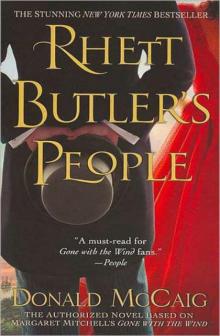 Rhett Butler's People
Rhett Butler's People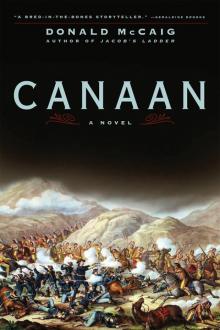 Canaan
Canaan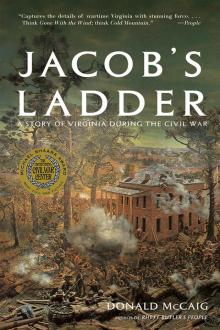 Jacob's Ladder: A Story of Virginia During the War
Jacob's Ladder: A Story of Virginia During the War Nop's Hope
Nop's Hope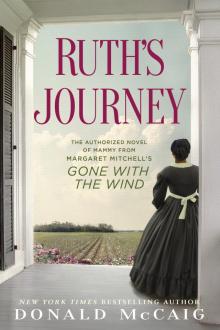 Ruth's Journey: The Authorized Novel of Mammy From Margaret Mitchell's Gone With the Wind
Ruth's Journey: The Authorized Novel of Mammy From Margaret Mitchell's Gone With the Wind Nop's Trials
Nop's Trials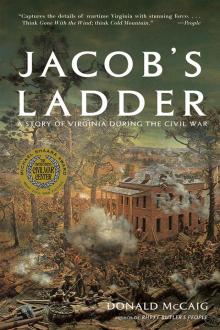 Jacob's Ladder
Jacob's Ladder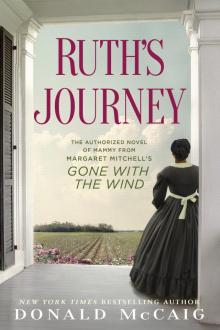 Ruth’s Journey
Ruth’s Journey Eminent Dogs, Dangerous Men
Eminent Dogs, Dangerous Men